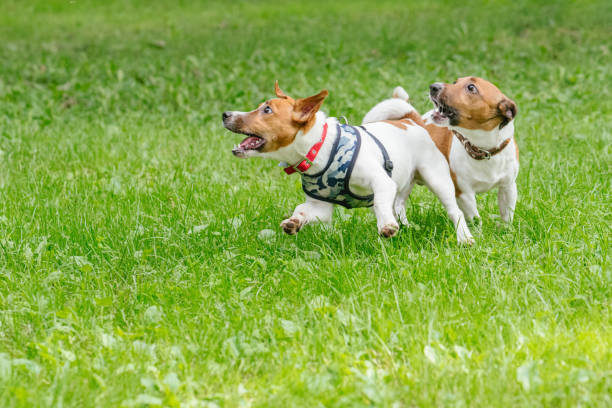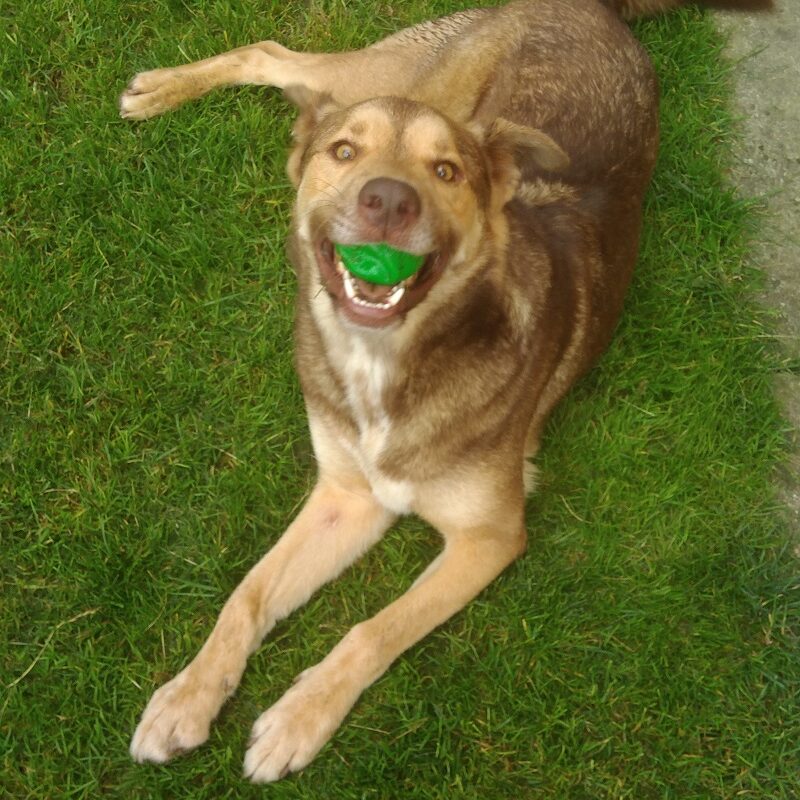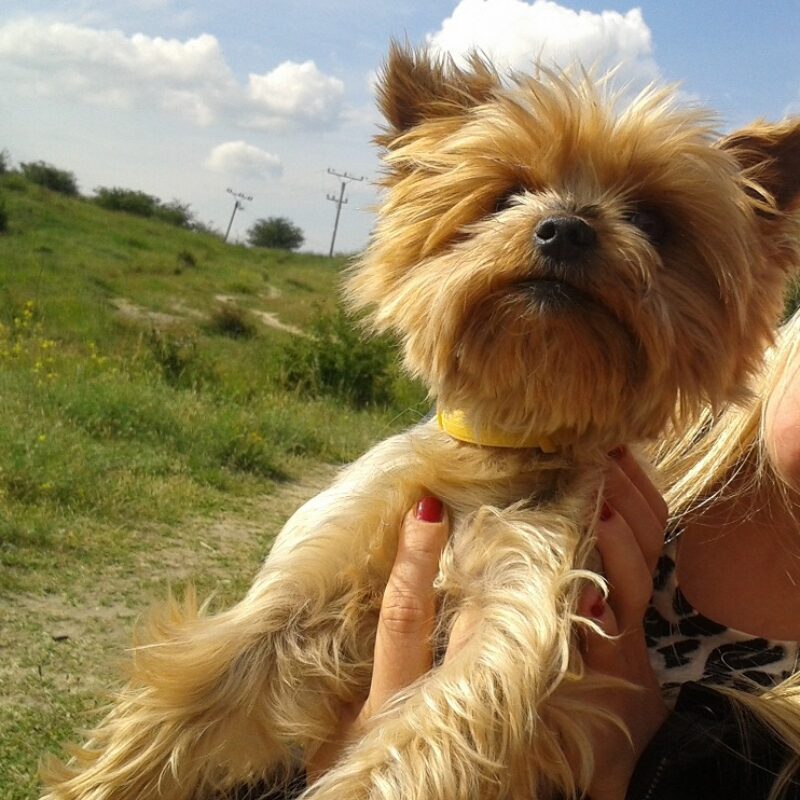Little Friends
Little Friends
Little Friends
Care for your dog/cat
Care for dogs and cats while you are away!
Hotel For Your Pet
Place for your dogs & cats to stay while your're away.
Training for your dog
Training sessions tailored to your dog's current needs.
I will lovingly take care of your pet

Hello, My name is Mirela and I’m a dog behaviorist, though you can call me a dog advocate. Why not a dog whisperer? That would imply there’s a magical spell and a universal method that instantly solves all dog problems. Nothing could be further from the truth! Working with a dog based on contemporary behavioral knowledge and positive methods relies on an individual approach to each dog while understanding their limits and needs. It’s a daily job for the caretaker, where I am the guide. My love for animals began in childhood when we raised an adopted German Shepherd.
OUR OFFER
I do believe that knowledge combined with empathy and „a heart for animals” is the key to solve all behavioral problems.
BY BOOKING OF ANY OF OUR SERVICES YOU AGREE ON TERMS AND CONDITIONS
DOSKONAŁANa podstawie 9 opinii Trustindex sprawdza, czy pierwotnym źródłem recenzji jest Google.
Trustindex sprawdza, czy pierwotnym źródłem recenzji jest Google. J S2024-04-13There is not a better place for your dog!! People are super friendly, professional and with an extensive knowledge about dogs! Always thankful for the help that I got for my little Daisy !! Highly recommended!Trustindex sprawdza, czy pierwotnym źródłem recenzji jest Google.
J S2024-04-13There is not a better place for your dog!! People are super friendly, professional and with an extensive knowledge about dogs! Always thankful for the help that I got for my little Daisy !! Highly recommended!Trustindex sprawdza, czy pierwotnym źródłem recenzji jest Google. Excerpts From2024-04-11I had an excellent experience with doggotive, who helped me in online consultations to address my dog's excessive barking. Their approach was compassionate, easy to understand, effective and tailored to what we needed. Now we have a much calmer home and a happier, more relaxed doggo. Highly recommend to any dog owner!Trustindex sprawdza, czy pierwotnym źródłem recenzji jest Google.
Excerpts From2024-04-11I had an excellent experience with doggotive, who helped me in online consultations to address my dog's excessive barking. Their approach was compassionate, easy to understand, effective and tailored to what we needed. Now we have a much calmer home and a happier, more relaxed doggo. Highly recommend to any dog owner!Trustindex sprawdza, czy pierwotnym źródłem recenzji jest Google. Sabina Biel2024-04-06Z całego serca polecam! Jesteśmy bardzo zadowoleni z usług Pani Mireli, która ma profesjonalne podejście zarówno do piesków jak i właścicieli 😉Trustindex sprawdza, czy pierwotnym źródłem recenzji jest Google.
Sabina Biel2024-04-06Z całego serca polecam! Jesteśmy bardzo zadowoleni z usług Pani Mireli, która ma profesjonalne podejście zarówno do piesków jak i właścicieli 😉Trustindex sprawdza, czy pierwotnym źródłem recenzji jest Google. Jan Mechliński2024-04-06I totally recommend!! Super praca z psem!Trustindex sprawdza, czy pierwotnym źródłem recenzji jest Google.
Jan Mechliński2024-04-06I totally recommend!! Super praca z psem!Trustindex sprawdza, czy pierwotnym źródłem recenzji jest Google. Joanna Waskan2024-04-05Mieliśmy trening podstawowych komend , 5 spotkań i jesteśmy ogromnie zadowoleni. Super efekty, zawsze na czas , ale najbardziej podobało nam sie, ze dostalismy ogrom super wskazówek jak prowadzić naszego dooodla a Joeya bardzo polubił panią Mirelle. Polecamy z czystym sercem i serdecznie pozdrawiamy!Trustindex sprawdza, czy pierwotnym źródłem recenzji jest Google.
Joanna Waskan2024-04-05Mieliśmy trening podstawowych komend , 5 spotkań i jesteśmy ogromnie zadowoleni. Super efekty, zawsze na czas , ale najbardziej podobało nam sie, ze dostalismy ogrom super wskazówek jak prowadzić naszego dooodla a Joeya bardzo polubił panią Mirelle. Polecamy z czystym sercem i serdecznie pozdrawiamy!Trustindex sprawdza, czy pierwotnym źródłem recenzji jest Google. Antek Jagoda2024-04-05Szukałem pomocy do mojego adopciaka rasy polski gończy. Jedna konsultacja i wszystkie zalecenia rozjaśniły mi o wiele więcej niż inna „trenerka”, która proponowała tylko obroże elektryczna. Bardzo polecam, super szczegółowe podejście do psa. Szkoda , ze pani już wyjechała z Polski.Trustindex sprawdza, czy pierwotnym źródłem recenzji jest Google.
Antek Jagoda2024-04-05Szukałem pomocy do mojego adopciaka rasy polski gończy. Jedna konsultacja i wszystkie zalecenia rozjaśniły mi o wiele więcej niż inna „trenerka”, która proponowała tylko obroże elektryczna. Bardzo polecam, super szczegółowe podejście do psa. Szkoda , ze pani już wyjechała z Polski.Trustindex sprawdza, czy pierwotnym źródłem recenzji jest Google. Sofia2024-04-04Great and nice service, Professional and meticulous approach and visible results.Trustindex sprawdza, czy pierwotnym źródłem recenzji jest Google.
Sofia2024-04-04Great and nice service, Professional and meticulous approach and visible results.Trustindex sprawdza, czy pierwotnym źródłem recenzji jest Google. Anna Karolik2024-04-04Pełen profesjonalizm i duża wiedza. Polecam każdemu kto boryka się z problemami swojego czworonoga, Pani Mirela bardzo mi pomogła. Pozdrawiamy <3
Anna Karolik2024-04-04Pełen profesjonalizm i duża wiedza. Polecam każdemu kto boryka się z problemami swojego czworonoga, Pani Mirela bardzo mi pomogła. Pozdrawiamy <3
Frequently asked questions
What is the difference between a dog behaviorist and a dog trainer?
If we were to answer in one sentence who a dog behaviorist is, we would compare him to a dog psychologist. A behaviorist knows that every dog is different and his problems should be approached comprehensively. A dog's behavior is made up of many factors from his canine experience to his diet to health and physiological issues. A behaviorist knows the importance of dog communication and the ability to read the signals sent by our pet. Working with a dog is not about “dominating” him, but about skillful understanding and cooperation of both parties.
A behaviorist is also most often a dog trainer , because training is one of the methods in working with a dog.
If someone is a trainer without a background in behavioral knowledge, he often tries to modify the behavior of the animal with methods that are not based on finding the cause of the problem and only on the elimination of symptoms.
Why should I take advice from a behaviorist when the Internet is full of advice?
Precisely because the Internet is full of advice 🙂 I used to be, before I took up the subject of dog behavior in earnest and before the study of dog behaviorism refuted a lot of stupidity , which I read on groups for dog people I was also a fan of Internet tips. Of course, that in the abysses of the Internet you can find wise, interesting and, most importantly, consistent with reality content. Unfortunately, in most of them there is no mention of the fact that each dog is an individual case and should be approached as such.
How to choose a dog trainer wisely?
If you want comprehensive training for your dog, don't hesitate to ask what methods the trainer works with and what the training session is like - especially at a place where the dog is left for several weeks. If the place to which you want to give your dog is still guided by the outdated theory of dominance ( from which its promoter himself has withdrawn) and the trainer begins the conversation with the words; we can't let our dog be dominated, then with a high degree of probability we can conclude that this place has no idea about modern behaviorism. If the trainer categorically forbids recording/photographing his sessions hiding behind “professional secrecy” consider whether it is the right place - even if it is recommended. There are no secrets in training a dog, instead there is work and time spent on it. In the last place where we heard about the ban on recording training, it turned out that the “trainer” held a mini leather whip in his hand and, unfortunately, did not hesitate to use it.
In the case of training with boarding, make sure that you will be able to see your dog at any time, in addition to this, make sure that in a given place the dog is not subjected to “breaking” attempts, for example, by sitting in a dark, cramped, closed cage, or is not starved for food as a reward.
Ask questions about whether a clip collar (called a choke) or electric collar shots are used during training.
Effective training is supposed to lead to the cessation of the use of such tools and not their implementation.
Also ask yourself: what's the point of spending sometimes even several thousand on training a dog if I'm going to get out of it with a choke?
Why don't we use violent methods when working with dogs or the methods used in K9 training?
We do not believe that in these times of unlimited access to knowledge and the latest research and behaviorist publications, working with a domestic dog must be based on any form of violence or very strong aversive methods.
As for K9 training, this is the type of training originally dedicated to service dogs. Different training will be needed for a German Shepherd who learns, for example, aggression on call and another for a Yorkie who lies with us on the couch. It's a bit like preparing a bodyguard in a clothing store for work through military training 🙂
We definitely cut off the methods of breaking the dog, because we do not want the work with the dog to look as described, for example, in the following articles :
https://www.hejto.pl/wpis/wesola-lapka#google_vignette
https://oko.press/mam-psa-i-co-teraz-interwencjazego we do not use violent methods in working with the dog or methods used in K9 training?
Why don't we answer questions about recommending a kennel for a particular dog breed?
If we check ourselves and can wholeheartedly recommend a particular kennel or breeder, information about it will certainly appear on our website.
For the time being, we invariably encourage you to scrupulously verify the place from which you take your dog. Regardless of whether you decide on a puppy from a registered kennel or not - you have the right to check the conditions from which the puppy is taken. Ask questions, find out which bitch's litter it is, when she was admitted previously, and unquestionably check the conditions for the puppies. Be especially sensitive to “kennels” (referred to as pseudo-breeding kennels) where there is an excess, often malnourished animals of various species in a small space, and the mother is exploited to the limit of her canine capacity. We don't even mention cases of kennels where pets sat in their own feces. Also, do not be fooled by explanations that the owner “accidentally” failed to take care of the bitch for the umpteenth time 🙂
Remember that your dog begins to form already in the neonatal period and its socialization period, which lasts from 4 to 12 weeks, can project later behavioral problems.
Also think about who you want to support with your money and whether you are not really buying a mongrel breed type for a few hundred dollars.
If you care about a particular breed, and currently can't afford a dog from a reliable kennel, see if the breed's foundations don't have dogs to give away. Often puppies also go to such places.

Our Gallery




























